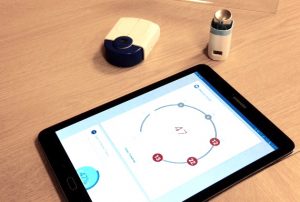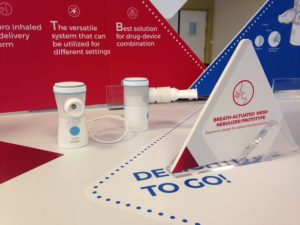
Aptar Pharma showed prototypes of its connected MDI and Prohaler DPI which work with the Propeller Health platform
The need to manage huge streams of data also came up in a talk by Professor Ashley Woodcock of the University of Manchester titled “The Salford Lung Study: Rethinking Clinical Trials by Assessing Effectiveness in Clinical Practice” during the meeting’s first session. In his presentation, Prof. Woodcock discussed the role of electronic medical records in the “real world” effectiveness study of Relvar Ellipta conducted by GSK in the city of Salford, UK. While the devices used in the study were not connected, managing the data from the thousands of patients enrolled in the study was the most difficult part, he said, and the study utilized linked health record systems across hospitals, clinicians, and pharmacies.

HCMedi’s prototype breath actuated Deepro nebulizer
In the exhibition, the majority of the device companies present displayed connected devices, whether recently launched such as H&T Presspart’s eMDI and 3M Drug Delivery System’s Intelligent Control Inhaler, or prototypes such as Aptar Pharma’s range of devices that connect to the Propeller Health monitoring platform via Bluetooth and HC Medi’s breath activated version of the Deepro nebulizer.


